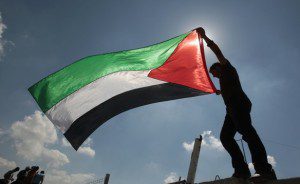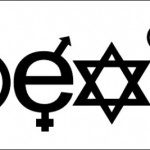By Obaid H. Siddiqui
If George Carlin were Muslim (a statement that is probably causing him to turn in his grave), his list of dirty words would have numbered eight — the last of which being Zionism. For years, the term has been narrowly defined by the militaristic violence and oppression perpetrated upon the Palestinian people. It is viewed through the lens of a military occupation, thereby tainting the word and its meaning for those who don’t abide by its underlying philosophy.
To dispossess the term Zionism from the suffering of the Palestinian people is not an easy task. But it’s one that is possible, according to Patheos Muslim blogger and Time.com contributor Rabia Chaudry.
In her article “What a Muslim American Learned from Zionists,” published by TIME, Chaudry, a highly accomplished lawyer and writer, leads her readers on her enlightening intellectual awakening of Zionism during a fellowship in Israel fostered by what she describes as the “unapologetically Zionist” Shalom Hartman Institute (SHI).
The SHI, which seeks to educate community leaders and change agents in order to revitalize and “elevate the quality of Jewish life in Israel and around the world,” invited Chaudry and other American Muslims to learn about Judaism first-hand in Israel, as a bridge-building initiative.
In a related blog post, Chaudry describes how hard the decision was for her to accept the invite. Israel, as she describes, was “reprehensible” to her, so she initially detested the idea of attending. After discussing with others and a bit of soul-searching, Chaudry courageously accepted the offer. (It’s not an easy choice to go across the world to learn from a group one considers to profess a detestable philosophy.)
Chaudry, like most Muslims, initially understood the term Zionism through the Palestinian perspective, deriving meaning only from the “nakba, a catastrophe for the Palestinian people … ethnic cleansing, a brutal occupation … collective punishment, stolen resources,” she writes.
Despite her hesitations and life-long commitment to the Palestinian cause, Chaudry describes how through the SHI fellowship she grew to understand and appreciate Zionism from the Zionist perspective. “I learned that Zionism means something very different for Jews,” Chaudry writes. “The Jewish people’s longing of thousands of years for a homeland, a return from exile, a sanctuary from being a hated minority in the diaspora, an opportunity to establish Jewish values and honor God, a Biblical promise, a chance for redemption.”
Chaudry’s experience with the SHI fellowship and her new found understanding represents a major step forward in creating much needed dialogue and discussion between two groups that seem to only speak past each other.
This is an imperative approach to building cultural and religious discourse within one of the most animus-driven situations in the world. Even more so, it’s an attempt at empathy; allowing one to understand and appreciate the nuances of another’s experience.
Though, this is where the semantics get a bit tricky.
From Chaudry’s account, it is easy to see that SHI and the Israelis encountered during the fellowship are promoting just another narrow definition of Zionism. They are opting for the spiritual and sympathetic meaning, leaving out the political implications of the philosophy. In doing so, they are redrawing the lines of the discussion – centering it on the historical needs of the Jewish people instead of acknowledging the very real and violent means taken to meet those needs.
It’s unquestionable that the Jewish people deserve their own homeland; an area they will always be safe and comfortable within to freely practice their culture, religion and lifestyle on their terms without fear. However, recognizing this need for a homeland doesn’t justify or acquit Israel for decades of oppressing the Palestinian people and preventing them from their own right to self-determined nationhood.
As a result, what initially reads as admirable empathy begins to devolve into false equivalency – a fallacy in which a logical equivalence between two things is posed, despite none existing. As described on Wikipedia, this fallacy is perpetuated when “one shared trait between two subjects is assumed to show equivalence, especially in order of magnitude, when equivalence is not necessarily the logical result.” Such false equivalence is visible within Chaudry’s descriptions of her evolving thought process.
Throughout her piece, Chaudry equates the suffering of the Palestinians with that of Israelis. “We personally witnessed hundreds of Muslim men denied access to the Al-Aqsa mosque for Friday prayers, and their quiet rage, and even tears, at the young Israeli security personnel who blocked the entrances and themselves seemed scared and unsure,” Chaudry writes.
Chaudry describes “the despair and anger of a burgeoning population of young, unemployed, restricted, dislocated population which carries with it the pain of generations” as portrayed in the Palestinian Muslim men not allowed to freely exercise their religious duties within holy sites on their land and equates it to the “scared and unsure” Israeli soldiers. By positing these two opposites – an oppressed people and an oppressive force – as equivalent, Chaudry implicitly justifies a previous thought which she describes as hearing often in conversation: “Most Israelis want to end the occupation but are afraid to.”
Since no greater context or explanation is given to describe what makes Israelis afraid, it remains a topic open for greater dialogue to understand the nature of that fear – is it based on the Israeli government and people being held accountable for decades of atrocities committed against Palestinians? If not this, then what is it they truly fear?
Further comparing the two sides, Chaudry continues by describing a “monumental” exchange: “The Muslim fellows [at SHI] understood Jewish fear and the Jews’ deep desire for a homeland after thousands of years of being a mistrusted minority. And Israeli Jews affirmed to us the daily devastation of the occupation and the shattering of Palestinians through which Israel was born.” Here, Chaudry juxtaposes the idea of understanding the Zionist perspective by Muslims with the tangible destruction of Palestinian land, people, and culture by Israel, viewing these two disparate thoughts as somehow similar.
Moreover, in a rather ironic metaphor, Chaudry equates the communication divide to that of a wall: “The walls have been built so high that breaching them to reach out to the other side is tantamount to treason.” Yes. The walls have been literally built high by the Zionists; a concrete barrier expected to stretch over 400 miles, reaching heights up to 25 feet, has enclosed Gazans within an open-air prison for two decades now.
What makes this false equivalency so dangerous is that it poses as moderate, conciliatory, and centered, thereby leaving those who disagree with it being branded radical, close-minded or extreme. But such moderation fails as it attempts to give equal weight to two dissimilar sides, whereas a more proportionate comparison would better serve to delineate the obstacles faced by both sides.
The trouble with the equivalency in empathy rests in two primary issues yet to be addressed by Zionist Israelis: accountability for decades of oppression and injustice, and the inherent anti-democratic racism of political Zionism that prejudicially promotes the success and livelihood of the Jewish people over all others, using all tactics — political and violent — to maintain a Jewish majority within Israel.
In his compelling deconstruction of colonialism, Frantz Fanon, the French-African psychiatrist and revolutionary thinker, wrote in the “The Wretched of the Earth”:
“National consciousness is nothing but a crude, empty, fragile shell. The cracks in it explain how easy it is for young independent countries to switch back from nation to ethnic group and from state to tribe – a regression that is so detrimental and prejudicial to the development of the nation and national unity.”
Given that, it’s easier to see how Zionism as a national consciousness can force Israel to view itself as an ethnic group or tribe rather than a democratic state. As a result, this “crude, empty, fragile shell” of thinking will not allow Israel to reconcile its violently oppressive past, present and anti-democratic future with the inclusion of rights for the Palestinian people. To do so is against the underpinnings of political Zionism.
It cannot be doubted that the intentions of Chaudry are driven by an honest attempt to bring understanding of the suffering and plight of the Palestinian people to Zionist Israelis via open dialogue, through a call for empathy to equally understand both sides. However, this is rendered quite difficult as long as the historical suffering of the Jewish people continues to be used as justification for the modern oppression of the Palestinian people.
Diplomacy, dialogue and empathy are noble goals, but fall insultingly short of bridging the divide when the Israeli government continues to kill, attack, imprison and sequester the Palestinian people on what remains of their land.
Until the Israeli government is held accountable for the forced expulsion of the Palestinian people starting in 1947; the refusal to acknowledge the internationally accepted 1967 borders; the continuously growing, illegally built settlements on current Palestinian land against international law; the sequestering and open-air imprisonment of Gaza; the death of countless civilians; illegal use of white phosphorus; refusal to allow Palestinian self-determination and statehood; and the detainment, imprisonment and harassment of nameless others on a daily basis, calls for dialogue and empathy will sadly continue to be viewed as false equivalence.
Despite these beliefs, people like Rabia Chaudry should be commended for their undying efforts to find communal peace by challenging each side’s perspectives through open interaction. In the face of such a colossal task as bringing peace to the Israeli-Palestinian conflict, those who continue to push forward with patient perseverance are fighting the toughest, and what seems like a constantly losing, battle.
Obaid H. Siddiqui is a freelance writer, Altmuslim contributor and journalist based in Philadelphia. He is a contributor to the anthology “All-American: 45 American Men on Being Muslim.” He can be followed on Twitter @OhSiddiqui.













